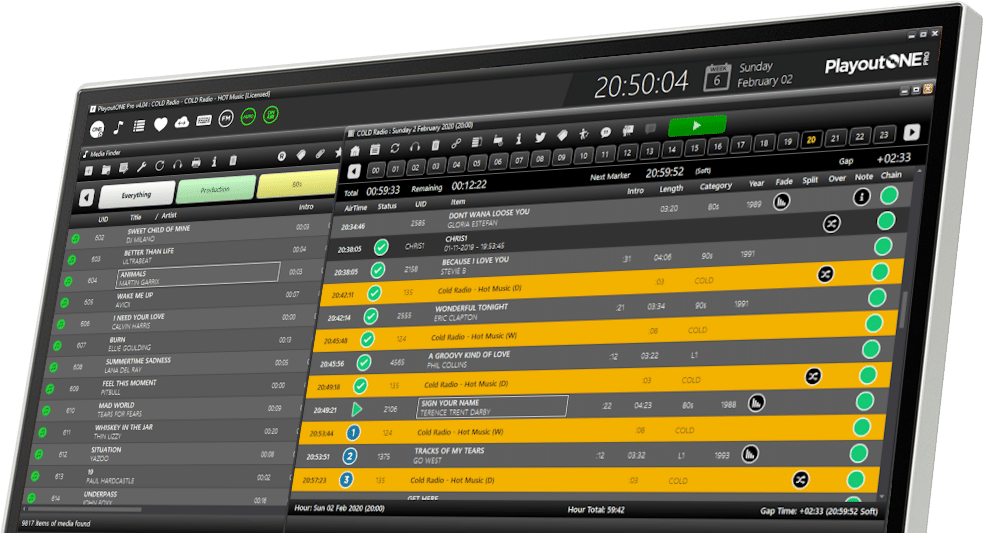With our internet radio stations, often we want to be able to play music by popular artists. And those artists expect payment for the use of their material. Such is generally handled by purchasing an appropriate broadcast license.
So how do we go about ensuring that we’re licensed to play the music we’d like to play on our internet radio station?
The answer is that we must pay one or more licensing organizations to gain the right to play such music. But it’s not quite that simple. As you must also ensure that your license covers the location and size of your audience.
In this article, we’ll go over how that works, and then give you the easy way to do it.
Disclaimer: this article is not legal advice. You’ll need to check your local regulations and licensing authorities.
WHY LICENSING IS NEEDED WHEN BROADCASTING AN INTERNET RADIO STATION
So why do we need a license?
People assume because they’ve purchased a CD or online streaming service, they’re entitled to play that music anywhere. Unfortunately, no such entitlement exists.
When you buy music for personal use, it is generally only licensed for that specific use. You can play it at home, in your car, and in a handful of other non-commercial situations.
You cannot make copies, use it for business or play it in public. This means that you can’t use it for things like playing in a physical store, school or non-profit organization or any other use that isn’t your own personal use.
Regardless of what it’s for, an internet radio station is unlikely to be classified as personal use. This means that to play music on your internet radio station, you’ll need to buy one or more commercial broadcast licenses.
LICENSING RULES
Before we get onto how to get a license, it’s important to go over the basic rules that cover licensing.
These rules are different in each country, so if your audience is international, you will need to buy separate licenses for each one.
To give yourself the best possible chance of staying on the right side of the law, you’ll want to use a geo-blocking service. Geo-blocking is a technology that restricts access to your internet radio station based on the user’s physical location.
The license that you buy will specify what music is covered, where you are allowed to play such music, to what audience, what time period is covered, and your maximum audience size.
There may be other restrictions, so it’s important to check the details of your licenses. The license itself is purchased from a licensing body.
LICENSING BODIES
A license is required for each country in which your audience is located.
For audiences in the US, licenses for internet radio stations can be obtained from ASCAP, BMI, SESAC, and SoundExchange.
Depending on your exact usage, you may need to buy licenses from more than one of these. If in doubt, start with SoundExchange.
For audiences in Canada, there are numerous licensing bodies. The main ones are CONNECT, CSI (CMRRA and SODRAC), SOCAN, and ReSound.
As with licensing in the US, you may need to purchase licenses from more than one of these. CONNECT Music Licensing explicitly covers broadcast music, so start with them.
And for audiences in the UK, licensing is handled by PPL for almost all commercially released recordings.
KEEP RECORDS OF EVERYTHING YOU PLAY
Licensing bodies are known to require regular audits, so it’s important to keep records of everything you play. Even a one-second clip of a song needs to be logged.
Start by writing a document that details the exact process you’ll follow to record what music was played and when. It doesn’t have to be complicated, just well-defined so that anyone can look at it and see what the process was. Keep that document with your business records, and follow it to create your logs.
As a minimum, you’ll want to record the artist’s name, the name of the piece of music, and the exact time and date it’s played. It can be helpful to also log the license that covers the particular piece of music and the play duration.
Your log should be a record of every event that you broadcast. Do not leave gaps where you are talking on the air, playing advertisements, or playing royalty-free music.
With an internet radio station, it’s possible to log how many listeners are tuning in. If your broadcast licenses specify a maximum audience size, make sure you keep logs of that with your other logs.
Be careful to not log anything that might violate various privacy laws, such as the personal details of listeners. In some jurisdictions, this can include technical data like IP addresses.
THE EASY WAY TO MAKE SURE YOU’RE COVERED
By now you’re probably thinking that there’s a lot to keep track of. With multiple licensing bodies for each country, it can be hard to know where to start. And we’ve not even talked about the necessary hardware, software, and content distribution technology to make it all work.
Luckily, even though it can be difficult for a human to keep track of everything required to keep on top of broadcast music licensing, computers can do it with ease.
There are many online services that will not only provide the necessary equipment but will also sort out your licensing and keep track of your listeners for you.
All for a single monthly fee.
All you have to do is decide which provider to use, answer a few questions, and your fully licensed internet radio station can be up and running in minutes.
To get you started, check out live365.com and radio.co. Both offer free trials so that you can try them out at no risk.
Facebook Comments Box
